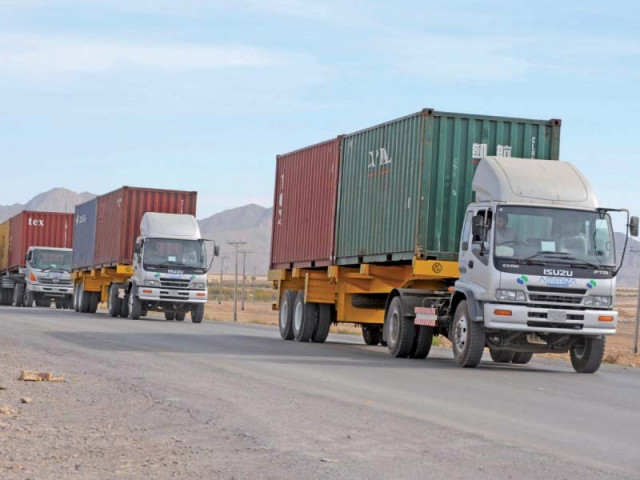Halt to Pak-India trade forces several out of work
In Pakistan, trade embargo has affected nearly 2,500 people working in various industries

Reports suggest that bilateral trade between the two countries in 2018 was valued at $2.23 billion. PHOTO: FILE
Six months into the crisis, the suspension of trade through the Wagah-Attari border has stopped the flow of state revenue and left thousands who rested on cross-border trade for their livelihood, unemployed.
Following the Pulwama attack, India had introduced 200% duty on the import of commercial goods and withdrew the Most Favored Nation (MFN) status of Pakistan. However, in August 2019, when India abolished the special status given to IOK, Pakistan in retaliation suspended all trade relations with the neighbouring country, rendering thousands out of work on either side of the border.
The most affected include labourers, locksmiths, customs clearing agents, small hotel staff and truck drivers who travel between the two countries.
One year on, villagers, soldiers recall the dogfight in Kashmir
According to estimates, in Pakistan alone, the trade embargo has affected nearly two and a half thousand people working in various industries.
Mohammad Siddique, a resident of a border village, for many years, made a living loading and unloading commercial goods at the Wagah border. After the suspension of trade, there was no more work left for Siddique at the border, leaving the labourer with no option but to look elsewhere to make ends meet.
"In the absence of trade, it was becoming increasingly difficult to make ends meet but I recently managed to scrape just enough loans to buy myself a motorcycle-rickshaw," he told The Express Tribune.
"Relations between the two countries have always been strained but trade has always continued despite the politics. There's still some trade happening in certain parts but if the government decides to put its foot down and end all trade, several more will be left unemployed," he added.
In the heyday of trade between the two countries, Ustad Abdul Hameed had used his lifelong savings to open a small restaurant a stone's throw from the Wagah border.
Hameed's hotel made business catering to businessmen, truck drivers and daily-wage labourers, who would take the trade route and stop for tea or lunch.
Where in its prime the restaurant would earn Hameed as much as Rs3,000 to Rs4,000 a day, the post-trade embargo situation landed the restaurateur in debt.
"The restaurant stopped doing business after they suspended trade but I was hopeful the trade would resume someday. However, the hope eventually ran out and the debt got so much that I had no option left but to shut down the restaurant."
According to Mohammad Wasim, a customs clearing agent, some 250 people around Wagah were involved in his profession when trade between the two countries was still booming.
"However, in the days after the embargo, it became increasingly difficult for the agents to pay office rent and eventually all offices were shut down one after the other," lamented Wasim.
"If the purpose of the trade embargo is to cause economic loss to each other, then why is Pakistan still facilitating Afghan-India trade through its trade routes?" he remarked.
As per Dilawar Khan, who is associated with a local commercial transport company, more than 24 of his company's trucks were involved carrying commercial goods across the border.
Proud of how nation dealt with India standoff: PM
"The company had acquired some of these vehicles on lease but after the embargo it became difficult to pay off instalments and as a result, half of the company's vehicles had to be sold."
Reports suggest that bilateral trade between the two countries in 2018 was valued at $2.23 billion. Imports from India were worth $1.82 billion while exports to India were worth only $41 million.
The goods which were exported to India from Pakistan via the Wagah-Attari border included dry fruits, cement, gypsum, glass, soda and limestone.
Even today, on the way to the Wagah border, piles of gypsum can be seen at several places along the Grand Trunk Road, but it has stayed there for over six months, depicting the abysmal state of trade between the two countries and the way it has affected several livelihoods in the process.
Published in The Express Tribune, February 29th, 2020.
Like Business on Facebook, follow @TribuneBiz on Twitter to stay informed and join in the conversation.



















COMMENTS
Comments are moderated and generally will be posted if they are on-topic and not abusive.
For more information, please see our Comments FAQ